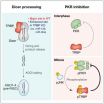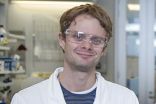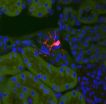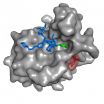(Press-News.org) Research at the University of Adelaide has discovered cancer cells may be particularly susceptible to metabolic stress - opening the way for new targeted therapy that won't harm normal cells.
The researchers showed that chromosomal instability - which is a hallmark of rapidly dividing cancer cells - makes them stressed and vulnerable to mild metabolic disruption. Metabolism is the normal process by which the body turns food into energy.
"A common problem in treating cancers is that they don't respond to chemotherapy, or they respond for a while, but then come back," says lead author Dr Stephen Gregory, Senior Postdoctoral Fellow with the University's School of Molecular and Biomedical Sciences.
"One reason this happens is because a tumour is usually not made up of identical cells but rather a diverse population of cells that changes all the time, losing and gaining chromosomes as they divide - so-called chromosomal instability. Sooner or later they change enough to be able to resist chemotherapy drugs.
"Our research has shown that chromosomal instability has some consequences for cells - they get stressed, and it only takes a small metabolic push to kill them."
Current chemotherapy is also very toxic to all dividing cells, particularly affecting cells in hair follicles, the gut lining and blood, often causing hair loss, pain and making patients unwell.
"We need to find ways to target cancer cells without affecting other normal dividing cells," says Dr Gregory.
The researchers induced chromosomal instability in small experimental flies, Drosophila, and found that the unstable cells were "on the edge" of how much stress they could tolerate.
"This is significant because a change in metabolism is something people cope with very well normally," says Dr Gregory. "That means that we hope to be able to develop treatments that have no side effects on patients, but are able to kill off the unstable tumour cells that cause relapses."
Dr Gregory says this may give some validity to theories of alternative treatments such as going on a radical diet.
"People who have advanced cancer which isn't responding to chemotherapy often try a range of different treatments such as a radical diet in the hope it may help," he says. "In some situations, it may in fact work; but we hope to be able to point the way to a more targeted approach - finding the most appropriate steps for intervention in the metabolic process that will give the best results."
INFORMATION:
The research has been published in the journal Oncogene. It is funded by the National Health and Medical Research Council and continues with a recent NHMRC project grant of $593,000.
Media Contact
Dr Stephen Gregory
NHMRC Senior Postdoctoral Fellow
School of Molecular and Biomedical Sciences
The University of Adelaide
Phone: +61 8 8313 7536
Mobile: +61 466 987 583
stephen.gregory@adelaide.edu.au
Robyn Mills
Media and Communications Officer
The University of Adelaide
Phone: +61 8 8313 6341
Mobile: +61 410 689 084
robyn.mills@adelaide.edu.au
The research team of the Center for RNA Research at IBS has succeeded in revealing that the dsRNAs and Protein Kinase R (PKR) regulate division of mammalian cells.
This finding will provide important clues to understanding the process of tumor formation and the mechanism for suppressing cancer since the abnormal cell division marks the early events of cancer development.
For the first time, the IBS research team has found that during mitosis, the cellular dsRNAs activate PKR, an enzyme previously known as a trigger of immune response during virus infection. Activated ...
Inflammatory skin diseases such as psoriasis may result from abnormal activation of cell death pathways previously believed to suppress inflammation, a surprise finding that could help to develop new ways of treating these diseases.
Mr James Rickard, Associate Professor John Silke and colleagues from the Walter and Eliza Hall Institute made the discovery while investigating how cell death pathways are linked to inflammatory disease development. The study was published today in the journal eLife.
Infected cells, cancerous cells, or those that are simply unnecessary to ...
Vitamin D deficiency is not just harmful to physical health--it also might impact mental health, according to a team of researchers that has found a link between seasonal affective disorder, or SAD, and a lack of sunlight.
"Rather than being one of many factors, vitamin D could have a regulative role in the development of SAD," said Alan Stewart of the University of Georgia College of Education.
An international research partnership between UGA, the University of Pittsburgh and the Queensland University of Technology in Australia reported the finding in the November ...
URBANA, Ill. - A 12-year University of Illinois study shows that, although the use of cover crops does not improve crop yields, the practice does increase the amount of sequestered soil organic carbon using three different soil management systems.
U of I soil scientist Ken Olson evaluated plots that were subjected to no-till, chisel plow and moldboard plow treatments with and without hairy vetch and cereal rye cover crops.
"By 2012, we found that the soil tillage plots that had cover-crop treatments had more soil organic carbon stock than those without cover crops ...
ROCHESTER, Minn. -- Most patients with triple-negative breast cancer should undergo genetic testing for mutations in known breast cancer predisposition genes, including BRCA1 and BRCA2, a Mayo Clinic-led study has found. The findings come from the largest analysis to date of genetic mutations in this aggressive form of breast cancer. The results of the research appear in the Journal of Clinical Oncology.
"Clinicians need to think hard about screening all their triple-negative patients for mutations because there is a lot of value in learning that information, both in ...
Researchers from Brigham and Women's Hospital (BWH) have identified what they believe to be the cells responsible for fibrosis, the buildup of scar tissue. Fibrotic diseases, such as chronic kidney disease and failure, lung disease, heart failure and cirrhosis of the liver, are estimated to be responsible for up to 45 percent of deaths in the developed world.
The findings are published online in the journal Cell Stem Cell.
"Previous research indicated that myofibroblasts are the cells responsible for fibrosis," said Benjamin Humphreys, MD, PhD, senior author of ...
New research from North Carolina State University and the University of Minnesota shows that the majority of consumers will accept the presence of nanotechnology or genetic modification (GM) technology in foods - but only if the technology enhances the nutrition or improves the safety of the food.
"In general, people are willing to pay more to avoid GM or nanotech in foods, and people were more averse to GM tech than to nanotech," says Dr. Jennifer Kuzma, senior author of a paper on the research and co-director of the Genetic Engineering in Society Center at NC State. ...
Bethesda, MD (Dec. 2, 2014) -- Women with celiac disease present with fertility problems no more often than women in the general population, according to a new study in Gastroenterology1, the official journal of the American Gastroenterological Association.
"Despite inconsistent findings from small studies, concern has been raised that celiac disease may cause infertility," said lead study author Nafeesa N. Dhalwani, PhD, from the University of Nottingham, United Kingdom. "Celiac patients should rest assured; our findings indicate that women with celiac disease do not ...
A research team from Kiel University (CAU) and Goethe University Frankfurt has jointly created a synthetic surface on which the adhesion of E. coli bacteria can be controlled. The layer, which is only approximately four nanometres thick, imitates the saccharide coating (glycocalyx) of cells onto which the bacteria adhere such as during an infection. This docking process can be switched on and off using light. This means that the scientists have now made an important step towards understanding the relationship between sugar (carbohydrates) and bacterial infections. Their ...
This news release is available in German.
The FK506-binding protein 51 (FKBP51) is an established risk factor for stress-related psychiatric disorders such as major depression. Drug discovery for FKBP51 has been hampered by the inability to pharmacologically differentiate against the very similar functional counterplayer FKBP52. Scientists at the Max Planck Institute of Psychiatry in Munich have now developed the first potent and highly selective inhibitor of FKBP51. The so-called SAFit-ligand inhibits FKBP51 enhancing growth of neuronal cell cultures and improving ...




